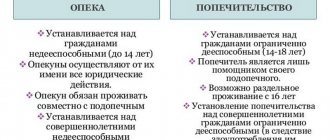Guardianship: concept
According to current legislation, a person who has reached the age of majority is recognized as legally competent.
He has the right to make transactions on his own behalf, represent his interests in court independently, deal with the preparation of documents in state and municipal bodies, as well as perform other actions on which his life depends. Until the age of 14, a child is considered legally incompetent. Parents or legal representatives make decisions for him; only his name appears in transactions. If a child turns 14 years old and is issued a passport, he is considered to have limited legal capacity and can independently enter into certain types of contracts with the written consent of his parents.
Guardianship is the placement of a minor or incompetent citizen under the guardianship of another person who meets the established criteria. This is done to ensure the legitimate interests of the ward. If a person is incapacitated, by law he is not entitled to enter into transactions. All transactions concluded on behalf of such a citizen after the establishment of incapacity are considered invalid and should not be allowed in the first place.
The appointment of a guardian is made by the guardianship authorities. This could be a close relative, friend, or even a stranger. The main condition is compliance with all criteria. Subsequently, such a citizen acquires all the rights and obligations of a guardian until the termination of the act of guardianship or indefinitely.
What grounds are needed to obtain guardianship?
Guardianship of an elderly person: after 80 years, how to arrange it, how much they pay
The elderly need constant care because they cannot fully meet their needs. The responsibility to provide assistance, as a rule, falls on the shoulders of relatives. The person who becomes the guardian performs household duties, including cleaning and cooking, and makes payments and other actions on behalf of the person in need of help. At the same time, carrying out this activity requires a lot of effort and time. The article will tell you whether guardianship for an elderly person .
In what cases is guardianship introduced in 2020: circumstances
The appointment of a guardian is mandatory if the medical authority that issued the conclusion on the citizen’s state of health has made a decision on this. Confirmation of the fact is carried out when the relevant decision is issued by the guardianship and trusteeship authority, an act of the Bureau of Forensic Medicine and other documents.
Guardianship is established by a court decision based on the recommendations of guardianship and trusteeship. In this case, the property of a citizen recognized by law as incompetent is transferred to the full disposal of the appointed representative. Transactions made by the owner independently do not have legal consequences, do not entail the exchange of property for money or other results of legal acts.
Expert opinion
In some cases, when the recognition of a person as incompetent is temporary, it is possible to establish guardianship - that is, guardianship for a short period, until recovery or other legal consequences occur. Under guardianship, a citizen has the right to make small everyday transactions, but large ones require the written permission of the trustee.
Rumyantseva O.T., employee of the guardianship and trusteeship authority
The legislative framework
Arranging for guardianship of a disabled person is a rather labor-intensive procedure. Subject to the law, which regulates all the defining moments of the action. Federal Law No. 48 “On guardianship and trusteeship” considers the following points:
- Powers of trustee bodies.
- Determination of the legal status of the guardian and the disabled person.
- Algorithm for appointing a curator.
- Rights and obligations of the parties to the relationship, as well as guardianship authorities.
- Restrictions on the legal regime of the property of wards.
- Reasons for termination of supervision and algorithm for canceling the appointment of a trustee.
Registration and other legal aspects of the relationship between the parties in the matter of guardianship are also prescribed in the Civil Code of the Russian Federation, Articles 35 and 40.
Registration procedure
Establishing guardianship over a disabled person of the first group - attaching a legal representative to a disabled (incompetent) person, who must act in the interests of the ward, protect and realize his rights. The authorized body has the right to assign an assistant forcibly to mentally ill people if they are not aware of their actions.
Guardianship over a disabled person of group 1 is established due to the patient having physical or psychological problems that have caused restrictions in one or another area of life. The conditions for assigning the first category are the presence of persistent deviations that prevent the applicant from working, coping with everyday issues, moving, and communicating without outside help.
| Legislative regulation | ||
| № | Project name, date of adoption | Questions about what regulates |
| Federal Law on social protection, dated November 24, 1995 | Specifies concessions that are guaranteed to disabled people in the Russian Federation | |
| Federal Law on Guardianship, dated April 24, 2008 | Establishes the concept of guardianship, trusteeship and the conditions for their provision | |
| 51 | Civil Code, dated November 30, 1994 | Art. 32 defines the circle of persons over whom care is established |
| Art. 35 talks about who can be a guardian | ||
| 223 | Family Code, dated December 29, 1995 | Establishes the possibility of establishing the care of children by third parties |
Design features
The registration procedure differs depending on the reason for establishing guardianship. There are several conditions for its appointment:
- physical disabilities - requires registration of disability;
- psychological problems - requires establishing the fact of incapacity.
Disability registration:
- Getting directions.
- Collection of information.
- Passing the ITU.
- Obtaining a conclusion.
- Contacting the guardianship authorities to establish guardianship.
Incapacity is established in the following order:
- Recognition of incapacity. The initiative can come from close people of the patient who can confirm their relationship with him. The institution where the disabled person was treated can also file a claim.
- Appointment of an independent examination. If the patient has deviations, an appropriate conclusion is made.
- Recognition by the court of the fact of incapacity based on an expert opinion.
- Approval of the candidacy of a trustee by the guardianship authorities upon presentation of a judicial opinion here.
Personality requirements
Guardianship of a disabled person can only be established by a legally capable citizen. It is assumed that the person must be an adult, able to work and not limited in special rights. Restrictions that prevent you from obtaining a special right:
- age under 18 years;
- incapacity by court order;
- restriction of the applicant's rights as a parent;
- alcoholism, drug addiction, other types of addiction;
- removal of a person from adoption or guardianship due to their fault;
- unexpunged, outstanding criminal record;
- health problems.
The applicant must provide all possible support to a disabled person of the first group, realize his rights, therefore the candidate must be a healthy, capable candidate in the working phase. Pensioners, disabled people, people with poor health do not have the right to establish guardianship, since they themselves need it.
Actions of a potential guardian
- Filling out the form.
- Collection of related documents.
- Conducting an inspection of living conditions by guardianship authorities.
- Issue of a commission by an authorized body.
- Issuance of a certificate.
Where to contact
Registration is carried out by the guardianship authorities. The procedure is initiated by an application and supported by relevant documents. The application is reviewed collectively. The decision is made no later than two weeks after the filing of the relevant petition.
Required documents for the ward:
Documents from the candidate for guardianship:
The procedure for appointing guardianship over an incapacitated citizen in 2020
The procedure for registering the rights of a guardian is carried out in several stages:
| Medical commission | Data is provided about the citizen in respect of whom it is required to establish the status of incompetent. Documents about the state of health are submitted as evidence - about the presence of a mental illness or physical disability that does not allow the citizen to control the condition. | The result is the receipt of a conclusion from the Bureau of Forensic Medicine, which is the main evidence for registration of guardianship. To issue it, you must undergo all medical examinations required by the nature of the disease, take tests, etc. |
| Submitting a claim to court for recognition of incompetence | Based on the submitted medical documents, the citizen’s ability to bear responsibility for his actions is established. | If the patient does not have the ability to control his actions, then a judicial act is adopted declaring him partially or completely incompetent. |
| Appeal to the guardianship and trusteeship authority to establish the status of a guardian | Only relatives have the right to send an application to the authorized body. Other citizens cannot exercise this right, even if the patient’s condition may cause them harm. | Also, applicants can be government bodies in the interests of an incapacitated person - for example, a guardianship and trusteeship authority. |
| Making a decision to appoint a certain citizen as a guardian | A close or distant relative is appointed as a legal representative if the former is not present or they have expressed disagreement. The decision is made by the main administration on issues of guardianship of the district | When making transactions on behalf of an incapacitated person, a guardian must be involved. Without his consent and signature, all concluded contracts are considered void by law, that is, they do not entail legal consequences. |
Expert opinion
The act on the appointment of a guardian indicates the terms for which restrictions are introduced on transactions without legal representatives, the types of property and funds transferred to the custody of the appointed person in the interests of the incapacitated person with a complete list and descriptions. If the mental or physical health of a citizen is fully restored after some time, then guardianship ceases to operate, about which a corresponding act is issued by the authorized authority that made the decision to introduce it.
Golovanova R.R., representative of the guardianship and trusteeship authority
Recognition of a citizen as incompetent
Ch. 31 of the Code of Civil Procedure of the Russian Federation regulates the procedure for declaring a citizen incompetent.
The procedure can be initiated by the spouse, relatives (brothers, sisters, parents, children), specialists from the guardianship department or employees of a medical psychiatric organization.
The application is submitted to the court at the place of registration of the citizen. The document must contain the reasons for declaring the person incompetent (illness, psychiatric disorder, alcohol or drug abuse). It is also necessary to describe the circumstances that indicate the person’s inability to control his actions.
In the process of preparing for the case, the court orders a forensic psychiatric examination. If he evades the examination, he is delivered forcibly.
The citizen himself, the prosecutor and a specialist from the guardianship department must be present in the process.
Important! The applicant is exempt from paying the fee.
Contacting the guardianship department
A prerequisite for the appointment of guardianship is the voluntary expression of the will of the potential candidate. He himself must contact the guardianship department and submit an application.
If within 30 days none of the relatives or strangers applies to appoint him as a representative of the incapacitated person, state guardianship is established over him.
Submitting an application
The application can be submitted:
- Through the guardianship department . The document must be completed in person, in writing. The applicant writes directly from the dictation of the guardianship specialist. He puts his signature.
- Through MFC . The application is printed by the MFC operator. The specialist fills out the form electronically based on the candidate’s documents. Subsequently, he prints out the form and the citizen signs.
- Through State Services . The application is completed electronically. Documents are attached in scanned form.
When submitting documents through State Services, the citizen must present the originals when visiting the apartment. Specialists of the guardianship department will refuse to issue an opinion if one of the necessary documents is not available.
Obtaining a guardianship order
Within 5 days from the date of submission of the application, specialists from the guardianship department must visit the apartment of the potential candidate. They check the citizen’s living conditions. If the documents were sent through State Services, the original documentation is checked during the visit.
The results of the inspection are documented in the form of a report. The document must be in written form. A second copy is given to the potential candidate. If false information is entered, the document may be challenged in court.
The result of consideration of the application is the issuance of a conclusion on the possibility of being a candidate. Only a person who has a prison sentence can be a guardian.
The guardianship department specialist issues the representative a resolution and a guardian’s certificate.
How to register incapacity
For an elderly person, a restriction of rights is issued upon recognition of the insolvency of the applicant. Only a court can assign the appropriate status to a citizen. The review process is initiated by an application from a relative, medical institution or control body.
What documents are needed
The court orders an independent examination, based on the results of which a decision can be made to limit rights. The expert's official opinion is attached to the case.
Registration procedure
- Determination of the candidate who will participate in the trial.
- Preparation of necessary documents.
- Filing a claim.
- Appointment of an expert examination by the court, making an expert decision.
- Obtaining a court decision.
- Contacting the guardianship authorities to assign a legal representative to the elderly person.
Participants in the process
The pensioner for whom restrictions may be imposed may participate in the case. But this is provided that his appearance does not create a danger to his own health, and also does not cause harm to other people present.
In addition to the ward, the meeting is attended by the applicant, a representative of the guardianship authorities, a psychiatrist, and a prosecutor. The applicant initiates the process. The prosecutor, based on the testimony of a psychiatrist, makes a decision to compulsorily conduct an examination if the participant in the process refuses it.
Rights of people with disabilities
For disabled people, a guardian can be appointed without recognizing the fact of incapacity. For this category of citizens, it will be enough to register 1 group, in which outside help is indicated. Since the applicant suffers restrictions in one of the spheres of life, an assistant is introduced to him. He makes all decisions regarding income and property disposal independently. The guardian only acts as a guarantor of the implementation of the will of his ward.
Those applicants who claim disability due to a psychiatric illness should not count on complete freedom of action. A restriction by a court decision entails a ban on disposing of property, concluding transactions, participating in elections and other legally significant procedures.
Legal representative, on behalf of a disabled person (limited in rights):
- makes deals;
- places the ward in social service institutions, transfers from one department to another;
- disposes of the pensioner’s assets at his own discretion, but in the interests of the owner.
List of required documents
Additionally, the citizen provides:
- passport;
- autobiography>;
- certificate and reference from the place of work;
- Form 2-NDFL (other confirmation of income received for 6 months is possible);
- certificate of no criminal record.
and other documents for registration of guardianship at the request of the supervisory authority.
Sample application
The guardian must personally handwrite the guardianship application. Keep in mind that the guardianship authority may not have enough information that you have provided about yourself and it has the right to apply for information to the Ministry of Internal Affairs, provided that the data relates exclusively to the applicant’s ability to fulfill guardianship obligations to his ward.
You can find the application form for establishing guardianship not only at the stand of the guardianship authorities, but also on the Internet (download and fill out at home).
Guardianship of an elderly person aged 80: requirements for a guardian.
The candidate must meet certain legal requirements. First of all, we are talking about the availability of a conclusion from the local OiP body.
The latter is issued upon submission of a package of documents. Both individuals and organizations act as guardians.
General requirements include:
- absence of a valid criminal record or expunged act against life (health);
- capacity;
- absence of socially dangerous diseases, alcohol dependence, drug addiction;
- age from 14 years;
- lack of employment;
- no pension contributions;
- refusal to register with the Central Prison Center.
If the last three points are fulfilled, the caregiver has the right to expect to receive compensation.
Who can be appointed as a guardian in 2020: basic requirements
A potential guardian for appointment must meet the following conditions:
- age maximum 55 for women and 60 years for men;
- no restrictions on legal capacity of a permanent or temporary nature;
- confirmed lack of criminal record and prosecution under articles of the Criminal Code of the Russian Federation for causing harm to life and health;
- if there are no contraindications to the status of a legal representative due to drug or alcohol addiction, tuberculosis or other problems of this kind;
- the presence of normal living conditions to accommodate the ward in his own living space, he will live permanently with a legal representative, as he needs control and care;
- Responsibility for an incapacitated citizen can be taken by both relatives and strangers.
Be sure to read it! Insult based on nationality: what article and where to apply
Requirements for applicants for the role of guardian
The law stipulates a list of persons who can apply for the role of guardian of an incapacitated person. They should file a claim for establishment of guardianship over the incapacitated person with the guardianship authority:
- family members, relatives - second spouse, one of the parents, sister/brother, children who have reached the age of majority;
- a person who is not a relative but has demonstrated a desire to become a trustee.
Moreover, neither relatives nor the person under guardianship should have any objections (if he is able to express his will). The personal qualities of the applicant, his health and other factors are also taken into account.
If a decision is not made within a month and a guardian has not been appointed, the placement of the incapacitated person in a specialized institution is formalized.
What kind of guardian should be?
The law clearly stipulates who can be the guardian of an incapacitated person.
Must be an adult, capable and willing to take on the responsibility of guardianship of an insane person. He must be able to perform guardianship duties. He is also required to be officially employed and not have problems with the law.
If the incapacitated person is treated in an appropriate institution, he is the guardian.
Who can be a guardian of a group 1 disabled person in Russia?
Only an adult citizen who has no problems with the law, is in good health, is not in a same-sex marriage, and does not suffer from alcoholism, substance abuse or drug addiction can become a guardian of a group 1 disabled person.
This must be a person with stable moral and ethical qualities.
A citizen who wants to become a guardian of a group 1 disabled person must understand what he is getting into. He must have a strong psyche and a normal, adequate perception of the situation.
He must understand that he will have to constantly help his ward, be with him day and night.
If the rights of the ward are violated, the guardian may face administrative, property, and in some cases even criminal liability.
Responsibilities of a Guardian
When caring for an incapacitated ward, the guardian is obliged to:
- Provide comprehensive assistance in everyday life: buy food, feed the sick, help with the toilet, help with training if necessary.
- Make decisions for him, represent his interests in court.
- Pay his utilities.
- Buy food, clothing, shoes, medicines for a disabled person or an elderly person recognized as incompetent.
- Clean the apartment where his ward lives.
- Receive benefits, pensions, alimony and other types of payments. Spend them exclusively on the person under your care or personally transfer the money into his hands.
- Take care of his property, use it carefully, and, if necessary and in agreement with the ward, sell the property.
- Establish friendly, warm contact with the ward.
- Protect your ward from aggressive actions of other people towards an incapacitated person.
- Regularly check on the person under your care if he or she is hospitalized.
- Monitor and monitor the state of his health, promptly seek help from specialists.
The procedure for registering guardianship over an incapacitated person
- A person must submit a written application to the guardianship and trusteeship authority of the region in which the incapacitated person lives.
- In addition to the application, the relevant authority must require documents such as: autobiography, income certificate, work record book, passport, medical certificate, document on no criminal record, written consent of relatives for the right to be a guardian, etc.
- After reviewing all the documents and their approval, a commission is appointed, which on the appointed day comes to the person who wants to become a guardian and conducts an examination of his living conditions. If his living conditions satisfy them, then they pronounce a verdict on appointing him as a guardian for the incapacitated person.
The relevant authorities should consider the issue of guardianship no more than 7 days.
Who is not appointed as a guardian?
The Family Code in Article 146 names those who cannot be guardians:
- chronic alcoholics or drug addicts whose illness is documented by a medical institution;
- those whom the court has already removed once from performing guardianship duties;
- persons unable to perform duties due to health reasons.
This applies to cases where guardianship is assigned to adult incapacitated citizens. If the person under care is a child, the list is updated with:
- deprived of limited parental rights;
- former adoptive parents, when they became such through their own fault.
In any case, a court decision is required to enter into force.
Documents required to establish guardianship
Potential guardians must prepare a certain package of documents, and for candidates who are outsiders to the future ward and his relatives, it will be somewhat different.
Outside citizens will have to submit to the PLO:
- Passport.
- Medical report.
- Certificate of completion of training in guardianship courses.
- Marriage certificate (if available).
- Consent to the establishment of guardianship from all family members of the potential guardian.
- Autobiography.
- Information about income.
- Application for appointment of guardianship.
Relatives who have been living together with a potential ward for at least ten years will have to submit to the PLO:
- Passport.
- Medical report.
- Marriage certificate (if available).
- Application for appointment of guardianship.
As you can see, the list of documents required to appoint guardianship for relatives is much shorter than for strangers. But the applicant must prove his relationship with the potential ward.
OOP specialists request some documents on their own. Among them:
- information on pension payments from the Pension Fund;
- information about the presence or absence of a criminal record of the applicant;
- extract from the house register;
- information about the sanitary condition of the living space;
- a conclusion that the applicant can (or cannot) become a guardian.
Guardian rights: benefits and payment for services
The guardian has the right to the following incentive measures from the state:
- Manage the income of the ward.
- Represent the interests of the ward.
- Use the benefits that the ward has.
- Receive payments from the state for care . This additional payment is issued by the Pension Fund of the Russian Federation, and for 2020 it is 1,200 rubles.
- Four additional days off every month.
- Additional leave at your own expense for two weeks once a year.
- Do not go to work on weekends and holidays , overtime and at night.
- Avoid business trips.
- Has the right to a reduced working day or week.
There are also benefits for guardians:
- Travel on public transport is free for a guardian if he accompanies his ward.
- Claims of a guardian in court up to a million rubles are not subject to duty.
- Fifty percent discount on notary services.
- Fifty percent discount on utility bills.
- Opportunity to receive free legal services.
- Additional points in the pension program.
How much pay
Guardianship is considered completely voluntary and is not paid for by the state.
When a guardian is appointed, an incapacitated citizen receives an increase in payments in the amount of 1.2 thousand rubles, which can be spent on paying for the services of a guardian.
At the same time, the caretaker can completely manage the pension of the ward, but only in his interests.
Also, the person performing supervision can count on the fact that the entire period of supervision will be included in his work experience. Also, some regions offer certain benefits: transport, tax, etc. They are often used for incapacitated citizens, but can also be used by guardians.
Please note: for a disabled child, the increase is slightly higher - 5.5 thousand rubles.
Guardianship is a complex and, unfortunately, virtually unpaid occupation by the state. Basically, guardianship is carried out by the relatives of the patient, since this requires maximum dedication and constant stay with the incapacitated family member.
Watch the video in which a specialist talks about payments to parents and guardians of disabled children:
Payments to guardians of incapacitated citizens
Guardians have the right to receive pensions and benefits for their wards, but they must be spent exclusively on the wards. OO&P will require reporting on this.
All working-age guardians who are unemployed are paid RUB 1,200 monthly. To apply for benefits, you must contact the Pension Fund.
Persons may be declared incompetent by the conclusion of a medical examination, and then trustees may claim the following:
| Guardians caring for incapacitated disabled citizens from childhood | RUB 11,445 |
| Caregivers caring for disabled people with an acquired group | RUB 9,538 |
Benefits are paid monthly to the Pension Fund and are subject to annual indexation. Regions may also provide additional payments.
Payments to the guardian of a disabled person of group 1
The amount of payments directly depends on the degree of relationship with the ward and other factors:
Responsibilities of a Guardian
In addition to the rights to benefits and privileges, responsibilities are established for guardians of disabled people of group 1, failure to comply with which may result in the guardianship being revoked:
- Maintaining optimal living conditions for the ward: preparing meals, purchasing food and medicine, performing other actions to ensure everyday comfort.
- Monitoring medical care: timely access to health care institutions, accompanying the patient to a sanatorium for treatment, etc.
- Maintaining the ward's home in order and cleanliness.
- Representing the interests of the ward in government bodies and other organizations where required.
What payments are due to a guardian of a group 2 disabled person?
Group 2 disabled people are most often limited in self-care and require outside help in some cases. Guardians of such citizens are not entitled to payments. Instead, they can use the property of their wards for their own benefit with their consent free of charge. If necessary, the guardianship authorities may allow the receipt of income from renting out the ward's housing.
Also, disabled people of group 2 are entitled to a pension and additional benefits. They should be spent only on him, but OO&P may allow partial spending of funds on the needs of the guardian.
Payments to the guardian of a disabled person of group 3
As mentioned earlier, disability of group 3 partially limits the ability to work, while a citizen can usually take care of himself. However, in some cases he needs outside help.
Guardians of disabled people of group 3 do not receive payments.
Right to inheritance
A guardian who is not related by blood to the ward, and therefore does not belong to any of the seven orders, has no right to claim inheritance by law. And with the registration of guardianship, he does not acquire inheritance rights.
But if there is a will in which he is named among the heirs, and this document is drawn up according to all the rules before the testator is declared incompetent, the trustee can inherit his share after the death of the ward.
Cohabitation
The guardian and his ward must live together, only if the ward is a minor. This is the case under civil law. As for incapacitated adults, the guardian should not live together, but separation is possible. The guardian, in this case, living separately, only visits the sick person, devoting to him as much time as his guardianship duties require.
By the way, if the trustee changes his place of residence, he is obliged to notify the guardianship authority.
Tax benefits if you have young children in your care
Tax benefits in the presence of young children in care, however, as well as their parents, can be provided to persons who are trustees. These are deductions for standard and social taxes, which are regulated by the Tax Code of the Russian Federation.
Let's figure out what the essence of standard type personal income tax deductions is. There will be no income tax charged on a specific salary amount, which for 2020 is 13%. In other words, deductions for guardians will be provided in the following amount:
- For the first two children who are under guardianship - 1,400 rubles.
- For the third and other children under guardianship - 3,000 rubles.
- For a disabled child of groups 1 and 2 - 6,000 rubles.
It is worth understanding that you can count on this type of benefit only if the baby has one guardian. If there are two guardians for each, the deduction will be half of the amounts indicated above.
Persons with children in their care have a number of social tax deductions. Their size is equal to the sum:
- paid for full-time education of the ward (the amount must be less than 50,000 rubles per ward for one year). You should know that temporary and former trustees have the same right when paying for education for children under 24 years of age;
- paid for the treatment of a minor or the purchase of medicines (the amount must be less than 120,000 rubles for one year, with the exception of expensive treatment in special situations).
Read also: How to remove a lien from a car?
To receive a social deduction after the year in which the expenditure occurred, you need to draw up a declaration and submit it to the tax office. In addition, you must attach a number of supporting documents. It should be remembered that there may be additional benefits established by the regional office. To find out about them, you should contact the relevant organization either by phone or in person with a question. There, consultants will provide professional advice regarding possible benefits in a particular case.
Responsibilities
The guardian in relations with his ward is responsible for the following points:
- Protects the interests and rights of the incompetent , in accordance with Articles No. 31 of the Civil Code of the Russian Federation and No. 37 of the Civil Procedure Code of the Russian Federation. This applies to any life situations, including court cases.
- Makes transactions on behalf of the ward , in accordance with Article No. 32 of the Civil Code of the Russian Federation. Including, if necessary, paying taxes, etc.
- Gives consent to the processing of information about a person incompetent , in accordance with Federal Law No. 152 of July 27, 2006.
- Takes care of the ward , according to Article No. 35 of the Civil Code of the Russian Federation.
- Makes decisions about medical care.
- Maintains property integrity.
- Monitors the ward for the safety of others , if required.
- If possible, introduces the incapacitated person to work.
As practice shows, providing good guardianship to incompetent citizens significantly increases their chances of rehabilitation.
Restrictions on the disposal of the ward's property
In the Russian Federation there are some restrictions on the disposal of the property of a ward:
- All income of the ward (for example, pension, benefits) must be spent by the guardian only on the needs of the incapacitated person..
- Transactions as a result of which the ward’s property may decrease in size can only be carried out with the consent of the guardianship authorities.
- The guardian does not have the right to make a gift on behalf of the incapacitated person , with the exception of ordinary gifts (the value does not exceed five times the minimum wage).
Restrictions that exist on the disposal of the ward’s property
When taking care of property, the guardian must be aware that there will be situations in his guardianship related not only to the maintenance of the things of the incapacitated ward, but also to their disposal (participate in transactions of various kinds)
But the trustee has no right to use the property and/or finances of the ward for personal gain. His actions must be performed solely in the interests of the ward.
The guardianship authority asks the person who has taken on guardianship of the incapacitated adult to provide detailed information about the costs. The report of the guardian of an incompetent adult in 2018 allows the supervisory authority to verify the loyalty of the relationship between the guardian and his ward. Annual reporting is an important responsibility of the guardian.
Appointment of a guardian
After the judicial authority makes a decision on a person’s incapacity, it is sent to the OPP at the place of his registration. Guided by Art. 35 clause 1 of the Civil Code, art. 11 clause 2 of the Law “On Guardianship”, specialists of this government agency are obliged to make a decision within a month on the appointment of a guardian or the placement of the patient in a specialized institution. Important: a citizen recognized as a guardian receives the right to act in the legal field on behalf of the incapacitated person. At the same time, his responsibilities include respecting the rights of the ward. A person whose responsibilities include guardianship of an incapacitated person must, in some cases, seek permission for his actions from the OPP. Without one, he is prohibited from:
- manages the property of the ward;
- enter into transactions on his behalf;
- sell or otherwise dispose of real estate and other valuables;
- pledge them;
- allocate shares;
- accept as a gift or acquire for your own benefit;
- participate in transactions with relatives regarding the property of the ward.
What privileges are assigned to trustees?
Often, caring for a disabled person does not allow a citizen to devote time to work. In this case, the patient’s curator is entitled to state payments of benefits towards the ward’s pension for care.
Payments must be made at the regional office of the Pension Fund. To do this, you must provide the following documents:
- Caregiver personal statement and biography. A sample application and a sample autobiography are located at the information stand in the Pension Fund.
- Certificate of absence of receipt of the guardian's pension.
- A certificate from the central bank stating that the future patron is not registered there.
- Copies of personal civil documents of both.
- Form of the OPP decision on the appointment of guardianship.
- Work records of both, if available.
In addition to receiving monetary allowance, the patron has the right to dispose of all the income of his ward.
Be sure to read it! PBU 8: contingent and estimated liabilities 2020
These include:
- Disability pension.
- EDV.
- Social services package.
- Charges for using public transport.
- Compensation payments for drug costs.
- For each year of guardianship over a disabled person of group 1, a citizen is awarded 1.8 pension points, which affect the registration of his own pension in the future.
If the incapacitated person has not previously issued such mandatory payments, then the guardian can independently take care of their appointment.
What benefits are a guardian entitled to as additional preferences, regardless of how much the ward and his supervisor receive;
- Free travel when traveling together.
- Fifty percent discount on transport tax and notary services.
- An initiated claim with indicated damage of up to one million rubles is not subject to state duty.
- Benefits for paying the costs of living space and other utilities.
All benefits provided to guardians are issued to specialized organizations upon presentation of the appropriate trustee certificate.
An employed curator in 2020 can count on:
- additional unpaid vacation days in the amount of two weeks;
- 4 additional days off per month;
- no long-distance business trips.
The curator on behalf of his ward is authorized to perform all legally significant actions, namely:
- Executes transactions.
- Represents interests in official organizations or court, except for participation in elections, since voting on behalf of a disabled person is impossible by law.
- If a disabled person owns property, then, with the consent of the guardianship authorities, the trustee can use it to make a profit, which by default is directed to the needs of the disabled person.
In general, according to the regulations, any use of the property of an incapacitated person must occur with the permission of the guardianship authorities. Otherwise, it is a violation of the law and faces criminal liability.
The curator does not have the rights to inherit the property of a disabled person. An exception may be:
- inheritance by law;
- the transaction was completed before the person was declared incapable of action.
The legislator did not provide for property relations between the parties, and the question of whether a guardian can sell an apartment can be answered by applying existing standards: without the consent of government agencies, persons looking after an unhealthy person cannot independently use the property of the sponsored person and carry out any forms of alienation.
Types of benefits for a guardian
The specifics of the benefits depend on who exactly the guardian is caring for - an adult disabled person or a minor (at the same time, maximum opportunities are provided for guardians of young disabled children under the age of 13 inclusive).
Labor
If a citizen is caring for an incapacitated adult, he can receive additional labor rights only by agreement with the manager (however, this is a right, but not an obligation of the employer). If the ward is a child under 18 years of age, the guardian is entitled to a fairly large number of labor benefits:
- Possibility to permanently work part-time or part-time (if the child is no more than 13 years old inclusive). At the same time, wages and other payments will be proportionally reduced.
- Refusal to work at night, even in case of production necessity, if the child is under 6 years old. However, at his own discretion, the employee may go out at night if he gives written consent.
- Similarly, you can refuse to work on holidays, weekends, overtime and business trips.
- The right to parental leave until the child turns 3 years old. Moreover, in the first 1.5 years from the birth of the child, the employee will receive a benefit in the amount of 40% of his average salary.
- The ability to choose part of the paid leave at a convenient time, if necessary to accompany a minor to enroll in a university or technical school (college) located in another city.
Tax
Guardians of adult incapacitated citizens have the right to receive compensation for payment of transport tax if:
- the car engine power does not exceed 150 hp;
- this benefit is provided for by the corresponding region where the citizen lives.
If guardianship is established over a child, the guardian has the right to receive a monthly tax deduction from official income (salary) in the amount of:
- 1400 rub. for 1 and 2 wards;
- 3000 rub. for each subsequent ward (starting from the third);
- 6000 rub. for a disabled child (even 1).
Note! If a minor has 2 guardians, the deduction is divided between them by 50% (700, 1500 and 3000 rubles monthly, respectively).
Others
The state has also established other benefits for guardians of incapacitated people:
- Partial compensation for housing and communal services (depending on the region).
- Free legal assistance (provided by employees of government organizations).
- Providing preferential medications for the guardian free of charge or at a discount.
Regional
The benefits described above for guardians of incapacitated disabled people are provided to all citizens at the federal level. However, in some regions additional opportunities are provided for such categories. For example, in Moscow in 2005, special law No. 60 was adopted, which gives guardians of minors (regardless of health status) the following benefits:
- additional monthly payments 1200 rubles;
- subsidies for housing and communal services, payment for a landline telephone in the apartment where the supervised child lives;
- compensation for abandoned children or abandoned children left without care;
- compensation due to rising prices (only for cases where the child has 1 guardian), etc.;
- 50% discount on kindergarten fees, etc.
Other regions have their own additional payments and “in-kind” benefits, but their list is usually smaller.
Labor benefits for guardians of minor children
Now let's compare the benefits granted to guardians of incapacitated people with the benefits granted to guardians of minors. According to the provisions of the Labor Code of our country, citizens who have minor children under their guardianship can enjoy similar benefits in the labor sphere as persons who are the biological parents of their offspring.
Unfortunately, guardians of minors are entitled to a much larger number of benefits. Thus, the benefits we are talking about in this case will be represented by the following phenomena. Table 2. What benefits are available to citizens who are guardians of minor children
| Benefit | Description |
| Part-time labor | A guardian of a child under 14 years of age has the right to work part-time or part-time (but it should be noted that wages will be reduced accordingly). |
| Legal refusal to engage in night work | Guardians of children under five years of age have the right to refuse to engage them in night work (the employer must notify them of this right in writing). If they do not mind going to work at night, then their written consent is issued. |
| Legal refusal of overtime work | Guardians of children under 5 years of age may refuse overtime work, business trips, or work on weekends and holidays. |
| The right to parental leave and to receive appropriate benefits | If the ward is not yet 3 years old, his guardian has the right to parental leave. He will also be paid a benefit in the amount of 40% of average earnings until the child turns 1.5 years old. |
| Assignment of additional annual leave (unpaid) | A collective agreement concluded in an organization may also provide for additional annual leave (no more than 14 days) for an employee caring for a child under 14 years of age. This type of leave is unpaid. |
| The right to take annual paid leave at specific times of the year | If a minor ward enters a vocational education institution in another locality and the guardian wishes to accompany him, then he has the right to take annual paid leave (or part of it) during the period of admission. |
Consequences of establishing the status of a guardian in 2020 for an incapacitated citizen
After the act of appointing a guardian is issued, all rights to property, including real estate, and funds in cash, in deposits and in accounts, are transferred to the disposal of the appointed person. A power of attorney for their transfer is not issued. The powers to make orders come by force of law on the basis of an act of the guardianship and trusteeship authority.
Important: Every transaction made at the expense of the ward’s property is subject to prior consent from the guardianship and trusteeship authority. It can be carried out only after receiving a positive conclusion from the state authority.
If transactions were carried out without obtaining the consent of the guardianship authority or contrary to the interests of property, housing or other nature for the incapacitated citizen, then the legal representative is deprived of his legal rights, and the decision on guardianship is annulled.
Responsibility of a guardian for the actions of an incapacitated person
In accordance with Art. 1076 of the Civil Code of the Russian Federation, if an incompetent ward causes damage to the property of third parties, then the guardian is obliged to compensate for the damage caused. The exception is situations where the representative can prove that the harm was caused through no fault of theirs.
Example . Victoria is the guardian of her incapacitated grandfather. The man does not pose a danger to others. The girl went to the store with her ward. A drunk group entered the store. The teenagers scared the grandfather. The man got scared and ran. He pushed the rack of alcoholic drinks. The rack fell and the bottles broke. The guards detained Victoria and her grandfather. The administrator began to demand compensation for the damage. The girl demanded to call the police. In the protocol, she recorded that the rack was located in violation of fire regulations. The minimum distance between posts was not observed. The store administration went to court demanding compensation for damages, but the girl proved that the cause of the current situation was a violation of fire regulations. The court refused to satisfy the demands.
Recognition of an elderly person as incompetent for guardianship
A person can be recognized as incapable of making independent decisions when there are sufficient reasons for this and they are compelling. The regulations for holding events are prescribed by law.
There are several reasons for an elderly citizen to be declared incompetent; several reasons are recorded in legal acts:
- age when it is not possible to move independently and take care of oneself;
- mental health disorders when there is no control over one’s own actions;
- the result of a serious illness when the patient loses the ability to control his own movements. A disturbance of consciousness occurs; the patient does not understand his own actions and the actions of others.
Today, the law stipulates three types of citizen’s incapacity:
- Age up to 18 years and after 80 years. These are two periods when a person cannot independently make legal decisions, take actions and be responsible for them.
- Mental pathology. As a result of brain dysfunction. A citizen is not able to demonstrate adequacy in reactions to the world around him. Therefore, he is declared incompetent and a guardian is appointed.
- Incomplete deprivation of rights, there are restrictions. But the actions and actions of a citizen are fully subject to the law; in case of violation, he will be held accountable.
The regulations for depriving a person of legal capacity are enshrined in article number 29 of the Civil Code. It is worth noting that only a court decision can recognize an individual as incapable of independent action. During the meeting, legal grounds and medical indications are considered. When legal criteria become the basis, it is understood that a person cannot be responsible for his actions and there is no control over them. When medical criteria form the basis of a decision, it is understood that a mental disorder does not allow a citizen to live a full life.
USEFUL INFORMATION: How and where to apply for divorce if you have minor children
To recognize a patient as incompetent, the following steps are taken:
- An application is submitted to the court along with a package of documents confirming the patient’s condition. This occurs either at the place of registration or at the location of the hospital;
- During the court hearing, an examination is appointed to determine the condition of the individual at the time the decision is made. If a citizen resists and refuses to undergo examination, then this is done forcibly;
- The prosecutor and the guardianship council must be present at court hearings.
After the trustee assumes his rights, he is responsible before the law for all the actions and actions of his ward.
What are the pros and cons?
Guardianship of an incapacitated person is hard work. Therefore, representatives are predominantly relatives.
They want to care for their loved one themselves or hire a caregiver to be confident in the quality of the services provided. State boarding schools in the Russian Federation in 2020 do not differ in service and proper conditions. In order not to injure the patient, guardians protect their usual living conditions.
Other advantages of guardianship over an incapacitated person are obtaining work experience and a minimum payment (compensation or remuneration).
The disadvantages include a high level of responsibility and workload, the psychological complexity of caring for and communicating with a disabled person. In addition, the guardianship department regularly visits the place of residence of the families of the wards. And every year you need to submit a financial report. The complexity of the procedure often leads to refusal to perform duties.
The procedure for appointing guardianship over an incompetent person is regulated by law. Often relatives become representatives of such citizens. If you have problems obtaining guardianship of your loved one, you should obtain legal advice.
Circumstances taken into account when applying for social protection
Guardianship for incapacitated individuals expands the powers of the caregiver. This is because the assistant is involved in all aspects of the elderly person's life.
- How much does a guardian of an elderly person earn?
- How much do caregivers pay for an elderly person?
- Guardianship of grandma how much do they pay?
The Civil Code stipulates that guardianship can be formalized in two forms: direct and patronage. In the first case, relationships are established if elderly citizens are not aware of what is happening around them, their actions, and the consequences of their actions. To protect such people from themselves and those around them, they are assigned an assistant who takes care of everything.
Is it possible to refuse supervision?
The legislation does not predetermine specific reasons for refusal of guardianship. Because of this, a citizen who wishes to make such a refusal can motivate it solely by personal motives, without the need to justify his position.
The preliminary reason for such an action on the part of the guardian may be as follows:
- Insurmountable disagreements between the parties to guardianship or members of their families.
- Nonverbal incompatibility of subjects of relationships.
- Contradictions between the interests of the guardian and the interests of the ward.
- Illness that interferes with the performance of guardianship duties.
- Lack of desire to continue fulfilling one's duties.
Often, the amount of control exercised becomes one of the factors in people’s refusal to fulfill the duties of a patron.
Arranging guardianship for people in need is not uncommon. Many people are ready to take patronage for their loved ones or friends. And if a person is completely healthy and law-abiding, then he will be able to become a guardian for adults or children of blood relatives or even strangers without any special obstacles.
What types of state support are required?
Caring for a disabled person requires complete dedication, as the caregiver will not have time to work. Therefore, before formalizing guardianship, you should find out what benefits are available to guardians of incapacitated people. Different disability groups of wards require slightly differentiated payments and benefits. There are also differences between the prerogatives granted to guardians of adult and child wards.
The state supports caregivers through additional payments to the ward’s pension and a system of existing benefits
Particular attention should be paid to the care of disabled people of group 1, since people in this category suffer from quite severe forms of illness, and caring for them requires more effort. Thus, the following benefits are available to guardians of group 1 disabled people:
- 50% compensation for housing and communal services.
- Sanatorium-resort treatment for disabled people and their guardians is free.
- Discount on transport tax and land tax.
- Relief from the burden of property collection.
- Labor benefits for parents raising a disabled child under 8 years old - flexible schedule, payment according to the time period worked, prohibition on business trips, overtime work.
- 50% discount for home phone.
- Preferential travel on national vehicles.
Benefits for a guardian of a group 1 disabled person from childhood include the same types of benefits as for trustees of the above category, but there is also some addition - early age pension. The reduction occurs in the proportion of a year per 1.5 guardianship. An important condition is the presence of an insurance period of 15 years for females, 20 for males. The total duration of such reduction does not exceed five years.
Benefits for guardians of group 2 disabled people include:
- discounts on utility bills;
- free social services;
- benefits when receiving education;
- discount travel on public transport.
Is it possible to get a preference in connection with caring for someone in need?
A person caring for an elderly person has the right to receive compensation payment. To obtain it, you need to submit a corresponding application to the Pension Fund of the Russian Federation. Compensation is assigned for each ward. It is worth noting that a patron can provide support to several people in need, for example, a married couple. At the same time, current legislation does not oblige the patron to live with the wards in the same living space.
You cannot receive compensation payments when caring for a citizen who has received two pensions. Thus, military personnel, law enforcement officers, firefighters, and employees of the Federal Penitentiary Service have the right to such deductions.
Package of papers for compensation
To receive compensation for caring for the elderly, you will need to fill out an application and collect a package of papers consisting of the following acts:
- passport;
- application of a citizen who is entrusted with the relevant responsibilities;
- petition of the elderly;
- information that the beneficiary does not have a place of employment, work book;
- a certificate from the Employment Center stating that the beneficiary has not registered as unemployed and is not receiving appropriate payments;
- passport and work document of a person who has reached retirement age;
- the conclusion of the medical commission that the person in need is truly unable to do housework or independently satisfy basic needs;
- a certificate from the university, if the patronage was issued by a student;
- a certificate from an educational institution, if the guardian is a school student. This is permitted with the consent of the parents;
- consent of the mother and father, as well as the guardianship structure located at the applicant’s place of residence (for persons under 16 years of age).
Important! Employees of the authorized body independently find out whether the ward has a second pension. In addition, the position of the chuck is carefully checked
What amount is provided to the beneficiary in the form of benefits?
The amount of payment may vary significantly depending on the region of residence of the applicant. The base value is 1.2 thousand rubles. The increase occurs due to multiplication by the regional coefficient.
A special feature of the payment is the transfer of funds through the ward. The money is provided as an addition to the pension provision of a citizen who has reached retirement age. A person must independently issue benefits to his patron. This procedure is strictly established by current legislation.
USEFUL INFORMATION: Can grandchildren claim an inheritance from their grandmother, how can a grandson get his share
Deductions are made for the current month and for previous periods. The maximum accrual period for past periods is 36 months. This procedure is relevant if the ward is an elderly person over 80 years of age.
Submitting an application can be done in several ways. The beneficiary independently chooses the one that is more convenient for him. So, the appeal is made:
- through a personal visit to the Pension Fund;
- through the State Services portal;
- with the help of a trusted person. Must have a document confirming authority with a notary's mark.
The period for consideration of the application is 10 days. If the authority decides to refuse the applicant and leaves the latter without payments, then the decision can be challenged in court. The deadline for providing a reasoned refusal is 5 days. If there are shortcomings in the text of the petition, the citizen will be able to correct them within three months.
If a person who has reached retirement age and is being cared for moves to a new place, the Pension Fund of the Russian Federation stops paying. The funds are assigned again by another territorial division of the Pension Fund of the Russian Federation. Payments are received on the 1st of the next month. In this case, the department department has the right to require the guardian to submit current documentation.
Legislative regulation
At the moment, the issue of guardianship of older people is regulated at the legislative level
Basically, this action is carried out on a reimbursable basis.
This issue is regulated by the following acts:
- Family Code, which stipulates the main points of obtaining guardianship.
- Civil Code, which specifies the rights and obligations of the parties.
- Federal Law No. 48-FZ on guardianship, which stipulates the nuances.
In addition, there are some regulations that also address the issue of guardianship of older people.










